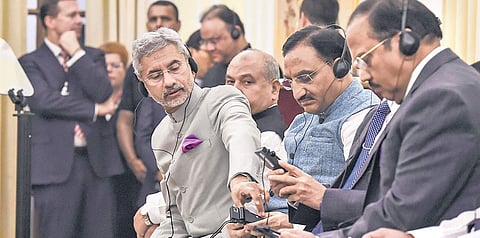

NEW DELHI: India and Germany have agreed to try and resume stalled negotiations for a comprehensive trade and investment pact between India and the European Union, a joint statement said on Friday.
The statement was issued after the meeting between Prime Minister Narendra Modi and German Chancellor Angela Merkel here. “Both sides confirmed the importance of a balanced free trade agreement between India and the EU and agreed to deepen efforts to restart negotiations between the EU and India on the Bilateral Trade and Investment Agreement,” the statement said.
With India set to sign a treaty with ASEAN and China, and Britain due to exit from the EU, top officials from the commerce ministry said there is a “sense of urgency” in restarting and “wrapping up trade talks.”
Germany is India’s most important trading partner within the EU.
Bilateral trade totalled $21.9 billion (19.6 billion euros) in the financial year 2017-18, an increase of 17 per cent from the previous year. India and EU have a bilateral trade of around $115 billion, of which $21 billion is accounted for Britain.
The comprehensive economic pact with EU, which includes both a free trade pact and an investment treaty, has been in limbo after years of back-breaking negotiations.
“We have to sort out a number of issues but the deal with EU, one of our largest trade and investment partners, is important for us,” said Prof Biswajit Dhar of JNU, a trade expert.
The Europeans have indicated that they won’t be able to move forward politically without an understanding on how the Indian automobile market would open up. They want to sell completely built-up cars at some stage, and seek relaxations in tariff on parts and car manufacturing kits.
Officials said the negotiations hinge on the timelines for opening up. “A delayed opening up can be looked at. But no opening up in the next five years can be allowed, given the precarious condition of our own automobile industry where sales have contracted by as much as a quarter,” commerce ministry officials said.
Other sticking points include India’s demands for freer movement of professionals and EU’s demands that duties on wines and liquors be progressively reduced. “However, these can be sorted out,” officials said.
Investment cover
Both India and EU also need to sign the pact, as the investment protection that each other’s companies get in the other’s territory is currently absent.